“Beware Lest Thou Forget”
Deuteronomy 6; 8; 11; 32
LDS manual: here
Reading
The real lesson manual has cherry-picked some scriptures from Deuteronomy — only four books out of the original 34. That’s okay, I suppose; the whole thing is kind of a rehash of Exodus and Leviticus. And in fact the word Deuteronomy means ‘second law‘ — we’ve already seen it the first time. But cherry-picking is not how we roll around here at GDG, so here’s a quick rundown of the whole book.
Moses is giving a final pep talk. “Hey,” he says, “remember the time we killed all the Amorites? And all those giants we defeated?”
2:11 Which also were accounted giants, as the Anakims; but the Moabites called them Emims.
“And we killed all the Heshbonites, including the children?”
2:33 And the LORD our God delivered him before us; and we smote him, and his sons, and all his people.
2:34 And we took all his cities at that time, and utterly destroyed the men, and the women, and the little ones, of every city, we left none to remain:
“And Og, the king of Bashan? and sixty cities, killing everyone?”
3:3 So the LORD our God delivered into our hands Og also, the king of Bashan, and all his people: and we smote him until none was left to him remaining.
3:4 And we took all his cities at that time, there was not a city which we took not from them, threescore cities, all the region of Argob, the kingdom of Og in Bashan.
“Well, you have to obey Jehovah, the one who commanded all these killings — in his mercy. ;)”
4:31 (For the LORD thy God is a merciful God;) he will not forsake thee, neither destroy thee, nor forget the covenant of thy fathers which he sware unto them.
I assume, since the winking smiley emoticon hadn’t been invented yet, that the 😉 in the above paragraph was a typographic convention in Jacobean times.
“So remember to kill everyone when you take their land.”
7:2 And when the LORD thy God shall deliver them before thee; thou shalt smite them, and utterly destroy them; thou shalt make no covenant with them, nor shew mercy unto them:
7:16 And thou shalt consume all the people which the LORD thy God shall deliver thee; thine eye shall have no pity upon them
“Oh, but love them.”
10:19 Love ye therefore the stranger: for ye were strangers in the land of Egypt.
“But destroy the symbols of their religions.”
12:2 Ye shall utterly destroy all the places, wherein the nations which ye shall possess served their gods, upon the high mountains, and upon the hills, and under every green tree:
12:3 And ye shall overthrow their altars, and break their pillars, and burn their groves with fire; and ye shall hew down the graven images of their gods, and destroy the names of them out of that place.
“And if anyone — even in your own family — worships a different god, kill them.”
13:6 If thy brother, the son of thy mother, or thy son, or thy daughter, or the wife of thy bosom, or thy friend, which is as thine own soul, entice thee secretly, saying, Let us go and serve other gods, which thou hast not known, thou, nor thy fathers;
13:7 Namely, of the gods of the people which are round about you, nigh unto thee, or far off from thee, from the one end of the earth even unto the other end of the earth;
13:8 Thou shalt not consent unto him, nor hearken unto him; neither shall thine eye pity him, neither shalt thou spare, neither shalt thou conceal him:
13:9 But thou shalt surely kill him; thine hand shall be first upon him to put him to death, and afterwards the hand of all the people.
13:10 And thou shalt stone him with stones, that he die;
God hates trees. Deforestation is kind of a problem in our day, but in Moses’s day, it was something of a goal.
16:21 Thou shalt not plant thee a grove of any trees near unto the altar of the LORD thy God, which thou shalt make thee.
“When you go to destroy a city, give them a chance to become your slaves first. (That’s called a peace offer.) But if they put up a fight, kill the men and take the women.”
20:10 When thou comest nigh unto a city to fight against it, then proclaim peace unto it.
20:11 And it shall be, if it make thee answer of peace, and open unto thee, then it shall be, that all the people that is found therein shall be tributaries unto thee, and they shall serve thee.
20:12 And if it will make no peace with thee, but will make war against thee, then thou shalt besiege it:
20:13 And when the LORD thy God hath delivered it into thine hands, thou shalt smite every male thereof with the edge of the sword:
20:14 But the women, and the little ones, and the cattle, and all that is in the city, even all the spoil thereof, shalt thou take unto thyself; and thou shalt eat the spoil of thine enemies, which the LORD thy God hath given thee.
20:15 Thus shalt thou do unto all the cities which are very far off from thee, which are not of the cities of these nations.
“Unless God really hates them. Then just kill them all.”
20:16 But of the cities of these people, which the LORD thy God doth give thee for an inheritance, thou shalt save alive nothing that breatheth:
20:17 But thou shalt utterly destroy them; namely, the Hittites, and the Amorites, the Canaanites, and the Perizzites, the Hivites, and the Jebusites; as the LORD thy God hath commanded thee:
“If you take over a city, and you see a woman you like, take her home and shave her head. Then after a month, she’s yours.”
21:10 When thou goest forth to war against thine enemies, and the LORD thy God hath delivered them into thine hands, and thou hast taken them captive,
21:11 And seest among the captives a beautiful woman, and hast a desire unto her, that thou wouldest have her to thy wife;
21:12 Then thou shalt bring her home to thine house, and she shall shave her head, and pare her nails;
21:13 And she shall put the raiment of her captivity from off her, and shall remain in thine house, and bewail her father and her mother a full month: and after that thou shalt go in unto her, and be her husband, and she shall be thy wife.
“Kill rebellious children.”
21:18 If a man have a stubborn and rebellious son, which will not obey the voice of his father, or the voice of his mother, and that, when they have chastened him, will not hearken unto them:
21:19 Then shall his father and his mother lay hold on him, and bring him out unto the elders of his city, and unto the gate of his place;
21:20 And they shall say unto the elders of his city, This our son is stubborn and rebellious, he will not obey our voice; he is a glutton, and a drunkard.
21:21 And all the men of his city shall stone him with stones, that he die: so shalt thou put evil away from among you; and all Israel shall hear, and fear.
“If a woman’s not a virgin when you marry her, kill her.”
22:13 If any man take a wife, and go in unto her, and hate her,
22:14 And give occasions of speech against her, and bring up an evil name upon her, and say, I took this woman, and when I came to her, I found her not a maid:
22:15 Then shall the father of the damsel, and her mother, take and bring forth the tokens of the damsel’s virginity unto the elders of the city in the gate:
22:16 And the damsel’s father shall say unto the elders, I gave my daughter unto this man to wife, and he hateth her;
22:17 And, lo, he hath given occasions of speech against her, saying, I found not thy daughter a maid; and yet these are the tokens of my daughter’s virginity. And they shall spread the cloth before the elders of the city.
22:18 And the elders of that city shall take that man and chastise him;
22:19 And they shall amerce him in an hundred shekels of silver, and give them unto the father of the damsel, because he hath brought up an evil name upon a virgin of Israel: and she shall be his wife; he may not put her away all his days.
22:20 But if this thing be true, and the tokens of virginity be not found for the damsel:
22:21 Then they shall bring out the damsel to the door of her father’s house, and the men of her city shall stone her with stones that she die: because she hath wrought folly in Israel, to play the whore in her father’s house: so shalt thou put evil away from among you.
Stoning for adultery still happens. Brunei will be starting it up next year. Here’s a handy infographic about it.
Just to be clear, religious belief has convinced some people in the 21st century that this is a perfectly acceptable way of dealing with people who cheat on their spouses.
“Also, don’t let your wives grab other men’s junk, not even as a method of conflict resolution.”
25:11 When men strive together one with another, and the wife of the one draweth near for to deliver her husband out of the hand of him that smiteth him, and putteth forth her hand, and taketh him by the secrets:
25:12 Then thou shalt cut off her hand, thine eye shall not pity her.
The always wonderful Brick Testament, ladies and gentlemen.
“Speaking of junk, here’s the list of people who can’t attend church: Nobody with testicle wounds or dickless; no bastards, and no Ammonites or Moabites. Geez, God really hates them!”
23:1 He that is wounded in the stones, or hath his privy member cut off, shall not enter into the congregation of the LORD.
23:2 A bastard shall not enter into the congregation of the LORD; even to his tenth generation shall he not enter into the congregation of the LORD.
23:3 An Ammonite or Moabite shall not enter into the congregation of the LORD; even to their tenth generation shall they not enter into the congregation of the LORD for ever:
“However, he doesn’t mind blind people, strangers, the fatherless, or widows.”
27:18 Cursed be he that maketh the blind to wander out of the way. And all the people shall say, Amen.
27:19 Cursed be he that perverteth the judgment of the stranger, fatherless, and widow. And all the people shall say, Amen.
“If you don’t obey all these things, then God’s going to give you haemorrhoids.”
28:27 The LORD will smite thee with the botch of Egypt, and with the emerods, and with the scab, and with the itch, whereof thou canst not be healed.
This video by nonstampcollector is fitting in so many ways.
28:30 Thou shalt betroth a wife, and another man shall lie with her: thou shalt build an house, and thou shalt not dwell therein: thou shalt plant a vineyard, and shalt not gather the grapes thereof.
“And you’ll eat your own babies when your neighbours besiege your cities.”
28:53 And thou shalt eat the fruit of thine own body, the flesh of thy sons and of thy daughters, which the LORD thy God hath given thee, in the siege, and in the straitness, wherewith thine enemies shall distress thee:
Notice that the Israelites brag about their ability to do this to other people when they besiege their cities — they just don’t want it to happen to them.
And endeth Moses: “I think that’s about it.”
Remember: this is God’s chance to give a message to mankind. He could have given us any kind of knowledge: about science, medicine, anything.
What he did instead was tell who you can own, and who you should kill. Spoiler alert: Everyone. And all in the name of brand protection!
Which is why Richard Dawkins was accurate in describing him thus:
The God of the Old Testament is arguably the most unpleasant character in all fiction: jealous and proud of it; a petty, unjust, unforgiving control-freak; a vindictive, bloodthirsty ethnic cleanser; a misogynistic, homophobic, racist, infanticidal, genocidal, filicidal, pestilential, megalomaniacal, sadomasochistic, capriciously malevolent bully.
And check out Steve’s blog post, giving scriptural support to each of these charges.
Main points from this lesson
“Beware lest thou forget”
In Dueteronomy, there’s a big emphasis on always remembering the god of the Old Testament.
6:12 Then beware lest thou forget the LORD, which brought thee forth out of the land of Egypt, from the house of bondage.
In two separate places, God commands the Israelites to put his words on their hands, foreheads, and the posts of their houses.
6:6 And these words, which I command thee this day, shall be in thine heart:
6:8 And thou shalt bind them for a sign upon thine hand, and they shall be as frontlets between thine eyes.
6:9 And thou shalt write them upon the posts of thy house, and on thy gates.
An unusual choice of fashion accessory, to be sure.
The lesson manual picks up this theme:
Why do you think Moses told the people to place passages of scripture between their eyes, on their hands, on the posts of their houses, and on their gates? How would such constant reminders affect our actions? What can we do in our homes to remind us of the Lord, his words, and our covenants with him? Do the pictures on our walls, the books we read, and the movies and television shows we watch remind us of the Lord, or do they suggest a longing for the world?
Let’s talk about pictures on the walls for a second. In the last ten years or so, Mormons have invented a tradition of putting pictures of their leaders on the walls of their homes. You can go to the homes of many Latter-day Saints and find a picture like this official portrait:
Or this:
Maybe this excellent Photoshop job:
Please not this:
Chillaxin’ in the temple.
There’s like a cottage industry for these things.
Whoops, wrong leaders. Only two of them. But does anyone else get a North Korea thing off of this? Why the leader worship?
Ironically, the “First Presidency portrait” meme is probably in violation of the “no graven images” meme.
4:23 Take heed unto yourselves, lest ye forget the covenant of the LORD your God, which he made with you, and make you a graven image, or the likeness of any thing, which the LORD thy God hath forbidden thee.
Now my memory is as bad as the next person, but what’s behind the constant exhortation to remember? If this god is as great as they say, why would someone need to keep him on their mind all the time? Wouldn’t it be obvious that he was real and powerful? Why is his existence and his influence so tenuous that it’s possible to forget it? Why does it need constantly shoring up?
Things that are true don’t need shoring up. They need to be publicised, of course, because information works best when it’s distributed. But things that are true don’t need to be believed in and constantly reiterated, like religious doctrines do.
The constant admonishment to remember religious norms is really about creating a bubble where the religious views won’t be challenged. The accompanying graphic in the manual resembles nothing less than an ideological bubble, where competing ideas just bounce off.
Again, when someone constructs a religious bubble, what they’re saying is that their ideas can’t compete with others on an equal footing. It’s a sure sign that the idea is weak.
Failed prophecies
How do you know if a prophet is a prophet? According to Deuteronomy, a prophet is fake if his prophecies don’t come true.
18:20 But the prophet, which shall presume to speak a word in my name, which I have not commanded him to speak, or that shall speak in the name of other gods, even that prophet shall die.
18:21 And if thou say in thine heart, How shall we know the word which the LORD hath not spoken?
18:22 When a prophet speaketh in the name of the LORD, if the thing follow not, nor come to pass, that is the thing which the LORD hath not spoken, but the prophet hath spoken it presumptuously: thou shalt not be afraid of him.
By that definition, Moses fails the prophet test. More to the point, Joseph Smith fares no better.
Additional ideas for teaching
Rape in the Bible
How can you get a wife, according to Deuteronomy? Here’s one way: If you “lay hold on” a girl, just pay her father fifty shekels, and she’s your wife!
22:28 If a man find a damsel that is a virgin, which is not betrothed, and lay hold on her, and lie with her, and they be found;
22:29 Then the man that lay with her shall give unto the damsel’s father fifty shekels of silver, and she shall be his wife; because he hath humbled her, he may not put her away all his days.
Now Christian apologists don’t like this very much, and to get around it, they play some word games.
The best apologist explanation I could find is that in the Torah, the word used for ‘seize’ is ‘tabas’. The word ‘tabas’ has multiple uses and doesn’t necessarily mean seized by force. For example, it could be used to describe the handling of a harp. From what I can tell, there is no formal word in the Hebrew language for ‘rape’, although I could be entirely wrong about the whole thing.
Of course! Since words have multiple meanings, just pick the one that corresponds to what you want. So when it says lays hold on her, it really means: he plays her like a harp. Yow. That’s some imagery.
I suppose that in Deut. 21:9, when parents are supposed to lay hold on their rebellious children (and stone them), it really just means caress them. With stones.
A quick and handy guide to biblical rape:
One more.
An unusual approach to crime investigation
If you find a dead body in the field, and you don’t know who killed him, here’s what you do: Cut off a cow’s head, and wash your hands over it. This will remove the sin.
21:1 If one be found slain in the land which the LORD thy God giveth thee to possess it, lying in the field, and it be not known who hath slain him:
21:2 Then thy elders and thy judges shall come forth, and they shall measure unto the cities which are round about him that is slain:
21:3 And it shall be, that the city which is next unto the slain man, even the elders of that city shall take an heifer, which hath not been wrought with, and which hath not drawn in the yoke;
21:4 And the elders of that city shall bring down the heifer unto a rough valley, which is neither eared nor sown, and shall strike off the heifer’s neck there in the valley: 21:5 And the priests the sons of Levi shall come near; for them the LORD thy God hath chosen to minister unto him, and to bless in the name of the LORD; and by their word shall every controversy and every stroke be tried:
21:6 And all the elders of that city, that are next unto the slain man, shall wash their hands over the heifer that is beheaded in the valley:
21:7 And they shall answer and say, Our hands have not shed this blood, neither have our eyes seen it.
Well, that would certainly make CSI a touch more surreal. And a lot shorter.
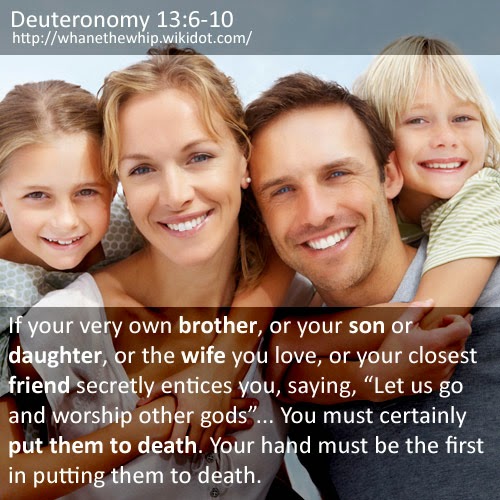

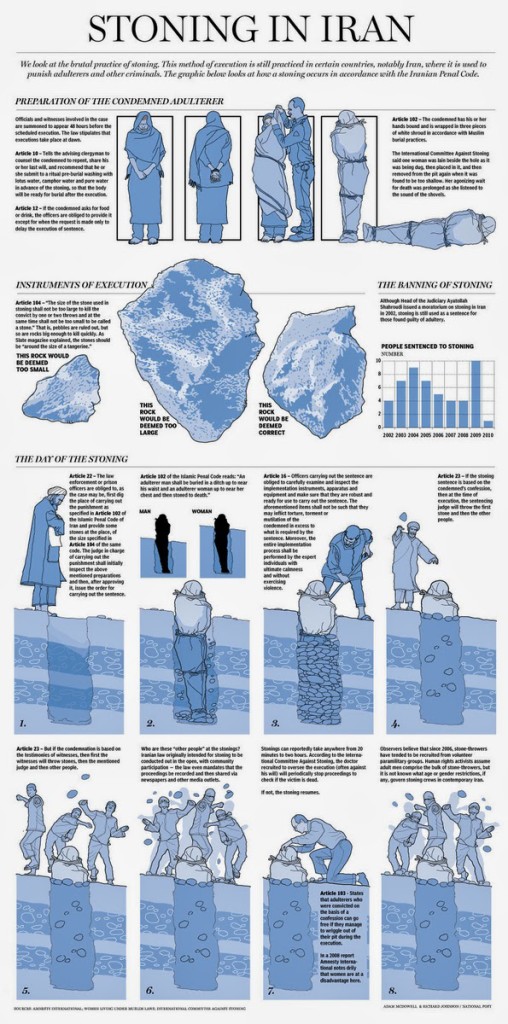

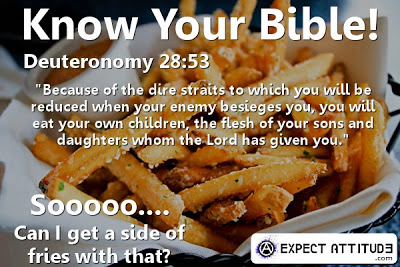
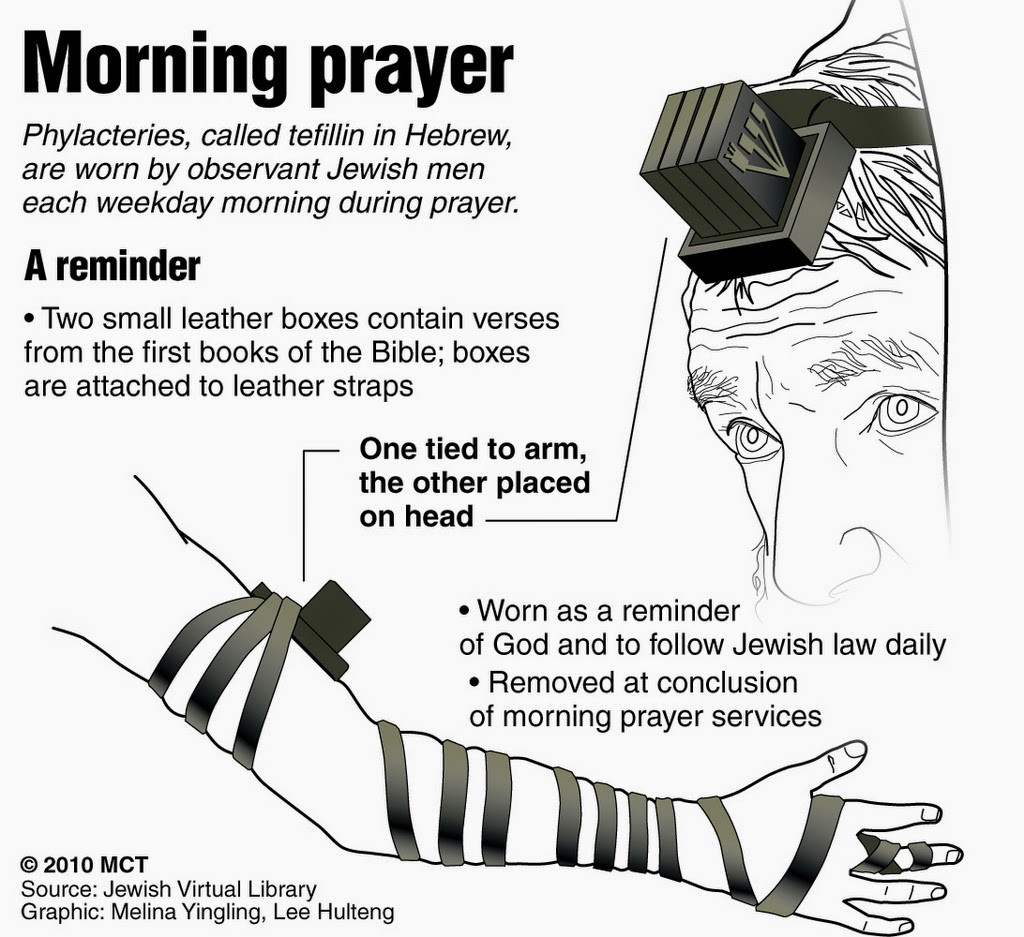







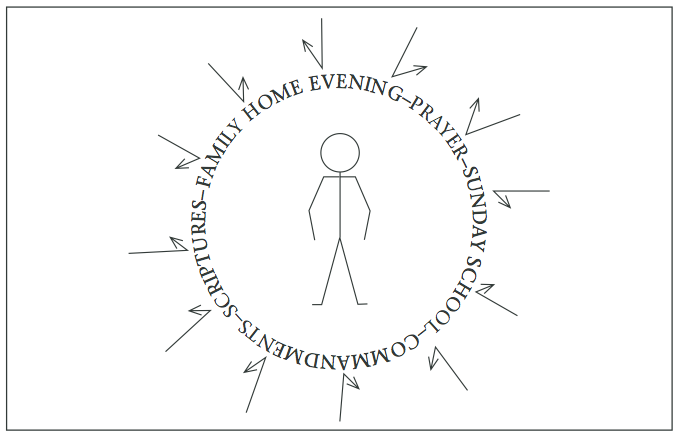

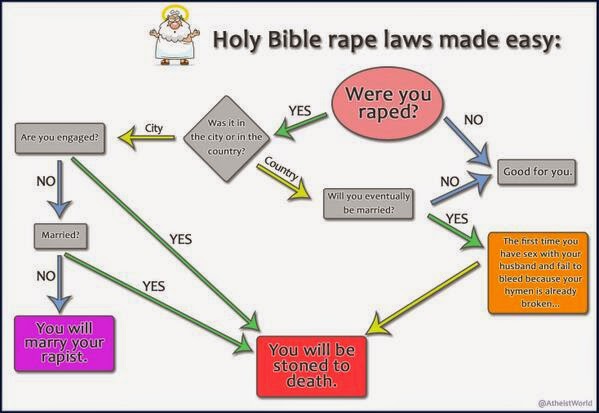

6 May 2014 at 2:39 pm
This business of hanging 8” x 11” colored glossies of the mortal Mormon trinity (made of the less “fine or pure” stuff) is a bit creepy. You know the Big Brethren have won the war when they get the little brethren and sistren to pay for the privilege being watched [1].
I’m waiting for the day when Deseret Books offers a digitally animated version. It could be equipped with a motion detector. Whenever you walked in the room the First Simulacrumency would “wake up” move their heads back and forth a bit – just like in General Conference – smile paternalistically, and offer a short uplifting scripture verse or gentle admonition.
Version 2.0 might have voice recognition software programed to deliver messages tailored what or who, it detects. Perhaps even responding to stress or negativity markers as well as unapproved words.
Version 3.0 will be linked to your Ward and personal calendar. Who better to remind you that tithing settlement is coming up or that you have only 4 more days to get your home-teaching done?
Version 4.0 will be holographic and linked to thermal and pressure sensors placed strategically around the house (or on your body). Depending on what you happen to be struggling with, the activation threshold can be lowered. And then – just when you need them, up pops the Brethren in 3-D.
[1] It just dawned on my – why don’t the sisters get the same holy archaic treatment?